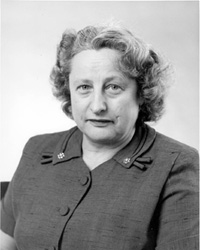Mary Shaw Shorb, Ph.D.
1907-1990

Dr. Mary Shaw Shorb, a research scientist, was born in Waupeton, North Dakota. She graduated from Caldwell High School in 1924, received a Bachelor of Science degree from the College of Idaho in 1928, and received a Doctor of Science degree in immunology from the Johns Hopkins University, Department of Poultry Science.
Shorb's most notable achievement was her role in the development of a bacteriological essay procedure for the compound now known as "B.C." Her essay made it possible to quantify the activity within various factions thought to posses activity within 24 hours. She worked with the research chemists at Merck and Company, complimenting their chemical expertise with her own abilities in the bacteriological field. This resulted in the identification and crystallizing of vitamin B.C. Vitamin B.C. is also known as the animal protein factor, animal growth factor, and pernicious anemia factor. This was a scientific breakthrough in the areas of human medicine and animal nutrition. The discovery of vitamin B.C. indirectly led to a reduction in the cost of producing animal products for human consumption.
Shorb has been widely recognized by the scientific community for her outstanding research. In 1948, she was a co-recipient of the Meadjohnson Research Award on vitamin B complex. In the same year, she also received the Hematology Research Foundation Award and the College of Idaho Distinguished Alumna Award. Other awards include Sigma XI Distinguished Scientist in 1961; College of Idaho Outstanding Graduate in 1966; and College of Idaho, Honorary Doctor of Science in 1983. In recognition of her work, Merck and Company established the Shorb Lectureship at the University of Maryland. This lectureship enables well-known scientists to give seminars and meet with faculty and students.
Biography courtesy of the Maryland Commission for Women, 1987.
